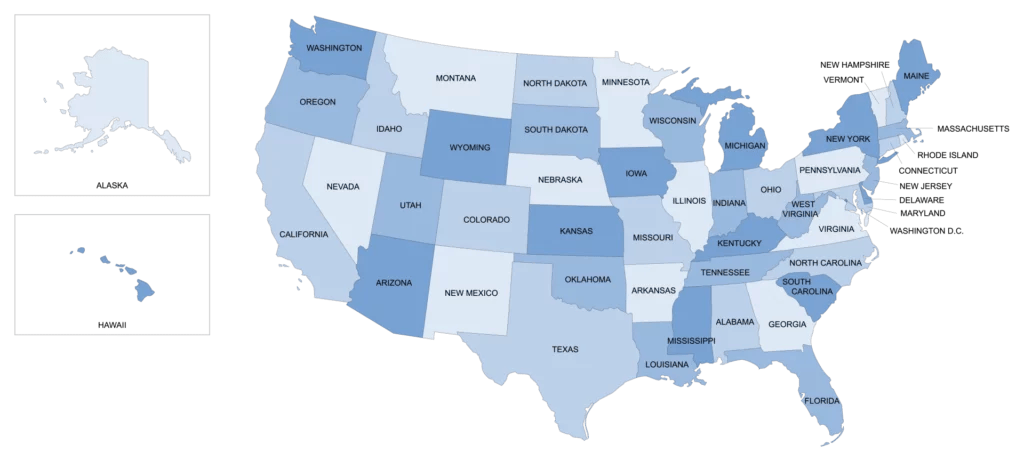To become a nutritionist, you’ll need to learn your state’s regulations, obtain the required education and certifications, get your state licensure (where applicable), and purchase liability insurance. Here’s how to get started!
How Do I Become a Nutritionist?
While the credentials you need to work as a nutritionist depend on the state you plan to work in, the steps required to navigate your journey are the same.
1. Research Your State Requirements
Your first step is to go on a fact-finding mission. Some states allow you to work as a nutritionist without a license, degree, or certification. However, some organizations looking to hire nutritionists may require more credentials.
While researching, you will come across different terms for or in relation to nutritionists, like:
- Nutritionist
- Dietitian
- Registered Dietitian (RD) and Registered Dietitian Nutritionist (RDN)
- Licensed Dietitian (LD) and Licensed Dietitian Nutritionist (LDN)

The good news is that RDs, RDNs, LDs, and LDNs are all essentially the same thing. The titles differ primarily based on educational programs and licensing state.
RDNs and LDNs, however, are not the same as a Licensed/Certified Nutritionist.
What’s the difference between a dietitian and a nutritionist? Dietitians have more schooling requirements and are heavily regulated. They often work in medical settings, while nutritionists usually offer more general counseling.
The important distinction is that nutritionists cannot provide medical care or give medically related advice, like prescribing meal plans to help manage a client’s diabetes or other chronic health conditions.
This lack of a universal certification path and the overlapping language in the fields of nutrition and dietetics can feel dizzying!
Pro tip:
A good way to help keep it all straight while researching is to remember: All dietitians are nutritionists, but not all nutritionists are dietitians.
Focus on the state you live and work in first. Locate your state’s official licensing board of nutrition and dietetics to find out the specific credentials that they require.
Also, be aware of the terms you use to promote yourself or sell your services if you are not certified. Some states consider “nutritionist” a protected title, meaning you cannot advertise yourself as a nutritionist unless you are licensed.

Different regions have different rules around licenses, and every state may or may not have these protected title laws. Keep this in mind and look for that information while researching.
If you do live in a state with protected title laws you may still be able to offer nutritional advice or coaching to your clients without a license. You could offer things like meal planning tips or advice about macros and different foods, as long as you don’t claim to be or advertise yourself as a registered/certified nutritionist.
Some states require a license or certification in order to legally practice any nutrition counseling. Within these states, you may also be required to have a master’s degree in a related field and/or a certain number of practical hours.
In the strictest states, like Ohio, you must become a Registered Dietitian (RD) to legally provide nutrition counseling.
This does not mean that if you work as a fitness professional you cannot give your clients advice! But you cannot “prescribe” a meal plan or diet, or advertise yourself as a nutritionist without the proper licensing.
In stricter states, the best practice is to keep it general unless you have the degrees or certification.

States With the Least Restrictions
States With Moderate Requirements
States With Strict Requirements
(Please note these are general lists only and state regulations can change. Check your local laws.)
Helpful Resources for How to Become a Nutritionist in Your State
- Nutritionist, Licensed Nutritionist, and Registered Dietitian Nutritionist state requirements directory with links to state licensing boards and regulatory websites
- Comprehensive licensing directory with overviews of state statutes and links to state credentialing sites from the Academy of Nutrition and Dietetics.
- State Nutrition Practice Laws PDF from American Fitness Professionals & Associates (AFPA) and the Council of Holistic Health Educators
- Career pathway options from the American Society for Nutrition (ASN)

2. Pursue Your Credentials
After identifying your state’s requirements, it’s time to locate, plan, and register for your credentialing courses. Generally, the more education and experience you have, the more credibility you have, and the more successful your career will be.
If your state does not have specific requirements in place, you may be able to become a nutritionist without a four-year degree. In these cases you may be able to provide nutrition services with an associate degree or a nutritional certificate.
Many professional fitness credentialing programs like NASM and ISSA have nutrition-themed courses that come with certificates.
Stricter states require you to obtain a bachelor’s and/or master’s degree in a related field, such as nutrition, dietetics, food science, etc. Some of these states dictate that in order to become a Licensed/Certified Nutritionist you must follow the same requirements as a Registered Dietitian (RD).

As of 2024, if you are looking to achieve an RD or Registered Dietitian Nutritionist (RDN) designation you will need to complete an accredited master’s program in a related field and pass the Commission on Dietetic Registration exam.
As part of your master’s or before you take your final exam, you may be required to complete upwards of 900 hours of supervised practical experience. Pending your personal background and education, though, some of these hours may be waived.
Overall, it can take up to 4.5–5 years to become a Registered Dietitian Nutritionist (RDN) or similar credentialed nutritionist. This is if you’re starting with no previous experience and plan to work in a more regulated state.
Based on individual experience and state rules, though, this time could be shorter. In states that allow it, you may be able to start work with as little as a nutritional certificate.
Helpful Resources for Pursuing Credentials to Become a Nutritionist
- Undergraduate and graduate nutrition programs list from ASN
- How to become a Registered Dietitian Nutritionist (RDN) from the Academy of Nutrition and Dietetics
- Online nutrition certificates
3. Apply for State Licensure
Once you’ve passed your final exam, identify your local licensing board and apply for your state license directly with them.
Depending on where you live and work, you may also need to complete continuing education (CE) credits and pay licensing fees.
Given the ever-evolving nature of the health and wellness world, continuing your education is important even if not legally required in order to keep up to date on the latest research and information.
Bonus tip:
Most health insurance companies will have restrictions about reimbursement or coverage for your services if you are not licensed.
Helpful Resource for Getting Licenced in Your State
Licensing statutes and links to state licensing websites by state from the Academy of Nutrition and Dietetics.
This page is extremely helpful and also includes an overview of paths to licensing, information about title protections and telehealth practices.

4. Get Nutritionist Liability Insurance
The final step in becoming a nutritionist is to take precautions to protect yourself and all the time and effort you put into pursuing this field!
Even with the utmost knowledge and experience, accidents can still happen. A client could trip and fall over a scale in your office, or someone could claim you caused them to have an allergic reaction.
Nutritionist insurance can protect your business in events like these with both general liability and professional liability coverage. You can further safeguard your business and finances with optional additional coverages which can help if your clients’ data is hacked or your equipment is stolen or damaged.
Providing proof of insurance can boost your trustworthiness and credibility to potential clients.
Please note: Insurance Canopy can provide coverage for services offered to clients such as diet guidelines, meal plans, or the sale/recommendation of health supplements. Dietary or nutritional related work for hospitals, assisted living facilities, nursing homes, home health care providers, health clinics, schools, or professional sport teams, along with the sale of medicinal or herbal products are excluded from coverage.

Nutritionist Specializations
Licensed Nutritionists may also be able to specialize in the work they do with additional certificates or education.
Nutritional consultant: provide nutritional information, counseling, and educational seminars. This is a good option for new, entry-level nutritionists to help build up their credibility, and a Certified Nutritional Consultant (CNC) exam does not require a degree to take.
Public health: work with local communities and/or government organizations.
Sport nutritionists: work with clients who are trying to improve their overall health via both diet and physical activity or with athletic clients looking to enhance their performance.
Weight management: work with clients to help them achieve weight loss goals in a sustainable way, as well as teach them how to maintain a target weight range via dietary planning and behavior or lifestyle changes.
Integrative nutrition: work with a holistic approach in mind to educate clients on how their diets can help contribute to their overall wellness.
Corporate wellness: work with businesses to implement a wellness program.
Media/communications: creating content for different publications or acting as a consultant on different shows and broadcasts.
Food/restaurant services: work with restaurants on menus and educate staff.
There are many additional specializations in the field of nutrition. However, most of these require higher education and/or some version of a Registered Dietitian designation. This would include things like:
- Oncology/cancer nutrition
- Diabetes nutrition
- Disordered eating nutrition
- Pediatric nutrition

FAQs About Becoming a Certified Nutritionist
Dietitian and nutritionist career growth is currently above the national average. It is projected to grow 7% from 2022 to 2032 per the US Bureau of Labor Statistics.
As of 2023 the median salary for nutritionists was $69,680 per year according to the US Bureau of Labor Statistics, which lists salary information for nutritionists and dietitians together. According to PayScale.com, the average salary for a nutritionist in 2024 is $52,273.
Salaries for nutritionists vary depending on region, experience, and education level.
Yes! Many nutritionists work as independent contractors, freelancers, or consultants.
Analytical, listening, organizational, and problem-solving skills are all important for nutritionists. Empathy is also important as health and dietary issues can be emotional for clients.
It costs from $600 to $6,000 to become a Certified Nutritionist, depending on local regulations. In states requiring formal licensure it will cost more.
A Certified Nutritional Consultant (CNC) designation costs around $600 for the exam and materials. Online certifications cost anywhere between $600 to $6000. In states that require higher education, you will have to pay tuition for those bachelor’s and master’s programs.





